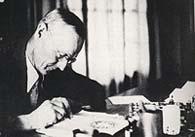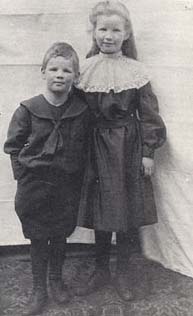
Herman Hesse was born into a privileged family in 1877. Both his father and grandfather were scholars and as a young growing person he read much of the great literature available through the family libraries. Hesse was a philosophical writer with his great novels reflecting his own experiences of life along with a of human values and morals. He had a great infinity for nature and time, and the way human beings are affected by their place in the world.
Hesse referred to words as a 'pallet to writers like paints are to the artist'. He believed different words appeal to people depending on their disposition and that you can understand the person by listening to their choice of language. Hesse had a favourite word that saw him from childhood to old age. He loved the feel and sound of this word, and to him it arose from the depths of earth and nature. 'It was not an invention by mankind but sprung from the very source of life itself.' This word is:
![]()
It is pronounced gl.... oe.. (as in shoe).... ck, and means... luck, fortune, happiness. 'The very sound of it', Hesse says, 'brings forth that feeling of lightness, life and joy.'

Herman Hesse wrote many essays stating his beliefs and I find them very interesting. One essay he wrote was about poetry and what I found most interesting were his thoughts on 'bad poetry', I guess it is a sensitive subject for me and maybe for many poets who have never attained great heights in public recognition. Read on if you can relate to what I just wrote because Herman Hesse even tells us that writing bad poetry is more fun than reading beautiful poetry! And I must say, I couldn't agree more!
"Something similar happens to me occasionally with bad poems. Suddenly they are no longer bad, suddenly they have a fragrance, a uniqueness, a childlike quality; their obvious weaknesses and errors are especially touching, are endearing and delightful, and by comparison the most beautiful poem, which one ordinarily loves, seems a trifle pale and commonplace."
(My Beliefs, H.Hesse 1974. p.67)
Now that statement gives me great confidence! He continues to write...
"In its origin a poem is something completely unequivocal. It is a discharge, a call, a cry, a sigh, a gesture, a reaction by which the living soul seeks to defend itself from or to become aware of an emotion, an experience. In this first spontaneous, most important function no poem can be judged. It speaks first of all simply to the poet himself, it is his cry, his dream, his scream, his smile, his whirling fists. Who would try to judge people's night-time dreams by their aesthetic value, or our movements of hand and head, our expressions and way of walking by their expediency? The babe in arms that puts its thumb or toe in its mouth behaves just as intelligently and properly as the author who gnaws his penholder or the peacock that spreads its fans. No one of them does better than the others, no one is more in the right than the rest."
The above statement is one about equality and the uniqueness of each individual person. It is a statement about being non-judgemental, allowing creativity to flow unfettered, and appreciating the essence of life as it is. Heese is acknowledging the rawness of life, the untamed and he can see the beauty in human spirit no matter what the level of education or experience. He goes on to say that tamed and refined work even though it may be beautiful can also be highly questionable and even repugnant!
"Now sometimes it happens that a poem, in addition to unburdening and freeing the poet, can also give pleasure to others, can move and touch them - that is beautiful. Very likely this happens when what is expressed is something common to many, possibly all....
Here is the beginning of a vicious circle. Because 'beautiful' poems make the poet beloved, a great quantity of poems come into the world that attempt nothing except to be beautiful, that pay no head to the original primitive, holy, innocent function of poetry. These poems from the very start are made for others, they are no longer dreams or dance steps or outcries of the soul... they are simply planned productions, fabrications, pralines for the public. They have been made for distribution and sale and they serve to amuse, inspire or distract their buyers. So just this sort of poem finds approval. One does not have to project oneself seriously and lovingly into such poems, one is not tormented or shaken by them, rather one sways comfortably and pleasurably in time to their pretty regular, rhythms.
Now at times these 'beautiful' poems can seem just as questionable and repugnant as anything else that is tamed and adjusted, like professors and officials. And sometimes when the proper world is is completely odoius to you and you have the inclination to smash streetlights and set fire to the temples, on such days the 'beautiful' poems all the way up to the holy classics strike you as a little bit censored, a little bit castrated, all too well approved, all too tame, all too auntlike. Then one turns to bad ones; then no poem can be bad enough."
I think this is a brilliant expression of how we seem to want to sew ourselves into smooth and refined cocoons and the tighter and fancier the cocoon the greater respect we anticipate, yet the need to break free and spread our wings can never be stifled. Smashing street light and setting fire to temples, those great institutions hemming us in, dictating our ways of life. Turning to bad poetry sounds much healthier than turning to some of the other resources on offer today. The best thing about it all, what I find most empowering about Hesses' words are that he says to write it yourself!
"The reading of bad poems is always a short term pleasure; you quickly get enough of it. So why read? Cannot anyone make bad poems for himself? - Try it sometime and you will find that making bad poems actually gives much more pleasure than reading even the most beautiful ones."
There you are, some very encouraging words from the great German philosopher, poet and author, Herman Hesse.
Now get out your pencil and let it rip!
Visit the Herman Hesse Homepage
A very comprehensive up to date site. You can see photographs of Hesses' homes, some of his drawings, read essays, and the links to related sites are of very high quality.